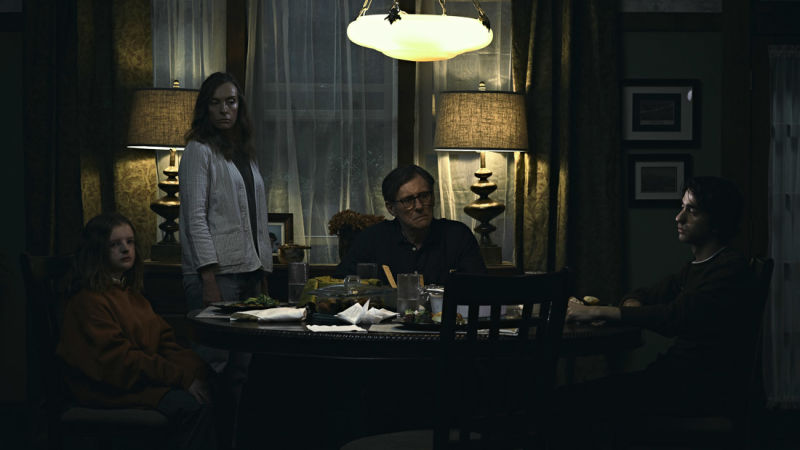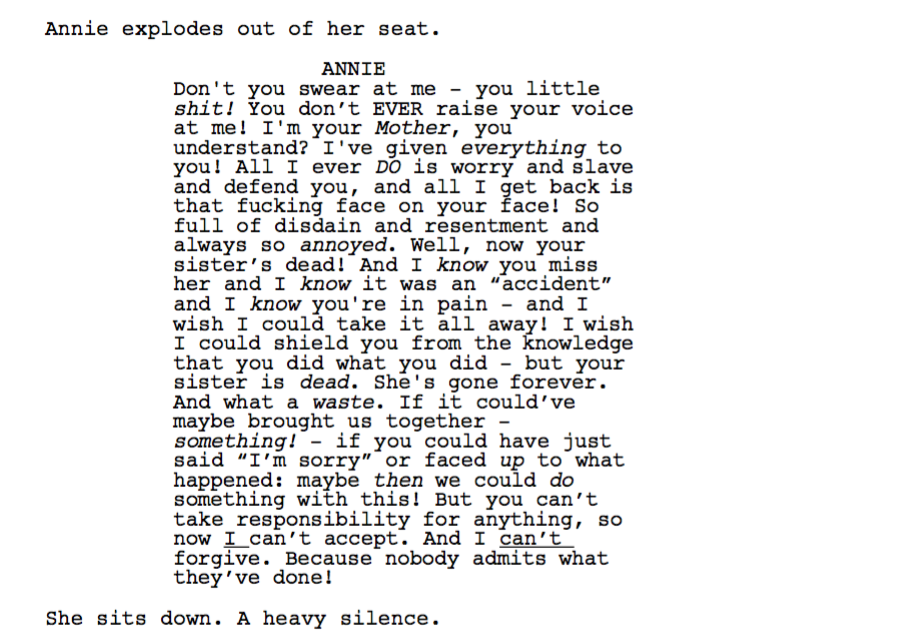Blueprints: "Hereditary"
 Friday, July 6, 2018 at 1:31AM
Friday, July 6, 2018 at 1:31AM This week, Jorge dives into how the setting and character introductions made this one of the most unsettling movies in years.

Horror films are far scarier when they are grounded by real fears. Sure, a ghost flying towards you or the sight of a little girl head’s spinning are objectively terrifying. But when a character's terror reflects the way we have felt at dire points, the horror movie seeps into our own lives, suddenly tangible.
Hereditary is as much of a family melodrama as it is a horror film. Its scariness doesn’t rely on a supernatural force (although there is one), or on gory and violent imagery (though there’s definitely some of that). The horror taps into the dynamics and secrets of family life. It takes regular fraught human emotions and raises them to unbearable levels...
Since the movie is so strongly grounded on its characters, let’s take a look at the first few scenes of the script, to see how writer-director Ari Aster establishes this family and world. He lets us know from the very start that something is really wrong underneath.
Hereditary
Written by: Ari Aster
Hereditary opens with an obituary. Although it does not appear in the script until later drafts, that initial text establishes right away the themes of death, family, and ancestry that will run throughout. In just a single shot, we understand what the mood and tone will be.
Then we move into Annie’s studio where she builds her miniatures. Throughout the film, she uses these figures to reflect on her fears and anxieties. They are a heavily controlled and curated representation of her reality; she has total control over them. As the camera pans over and shows us a model of her home; we push inside it until it covers the frame completely. Then the story begins.
This initial sequence gives the impression that what we are about to witness is not unlike Annie’s miniatures: they are a projection of this woman’s worst fears come to life. They are controlled by someone… or something. They are of her own making, and at the same time, they are unreal.

***

***

The first character we meet is Peter (Alex Wolff), the eldest son, whose “status as a miniature has now been confused.” His father Steve wakes him up, and kick starts the “real world” of the movie. We are now in their reality. It is worth noting that these are the two first characters we meet. Though Peter's relevance and weight aren't fully apparent until later, the script is telling us from the very start, with that slow push into his bedroom.
The first time we meet Annie (Toni Colette) is in the car, waiting to go to her mother’s funeral. Before we even read her name, we learn that she is a “bereaved” woman. The script tells us that she is beautiful in a “worn” way, and that she “looks emotionally exhausted.” Any other characteristic could have been conveyed to us as a first impression, but Annie comes across as overwhelmed and beaten from the start. It will not get any better for her.
The last member of the family we meet is fourteen-year-old Charlie (Milly Shapiro), who is introduced sleeping at the treehouse (which, SPOILER ALERT, is also where the movie ends). She is described as “plump and androgynous”; a look that was not precisely replicated on screen, but that Shapiro fills with emotional uneasiness and ambivalence instead of gender neutrality. The first thing we learn of her is that she is not where she is supposed to, and that she is keeping some sort of secret as she “frantically reaches to shut the shoebox” when her Dad finds her. Before the audience knows what is happening, the script has already laid all the groundwork for her character.

***

In just under two pages, the script for Hereditary establishes the thematic links and undercurrents of the movie, emphasized the importance of its location, and introduced the characters in subtle ways that carry enormous emotional weight for their arcs and journeys.
This is well before there’s any notable dialogue or the plot has kicked into gear. Proper scares will wait. However, that unnerving feeling that something is about to go awry has already started to seep into our veins, and will slowly start to overtake us along with the family.
*tongue pop*



Reader Comments (3)
eager to see this again, and look especially carefully at all this establishing. The movie doesn't meander exactly while you're watching it but the deliberateness is stealth if you will. It's always coming but in so many ways it also feels like just a bereavement drama for awhile.
One thing that suddenly dawned on me is whether Ann Dowd was in the first meeting at the hall or if she just appeared later and pretended she was. Little things like that keep popping up in my memories, which is partly why I think the film works so well.
I do think that Hereditary is far scarier because it is depicting real fears that hunt us in our daily life. Believe me, You need to click edubirdie.org website so as to read unique reviews. I was not able to completely watch this movie since it contains many scary scenes that I cannot cope with.